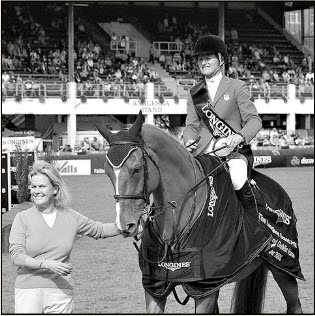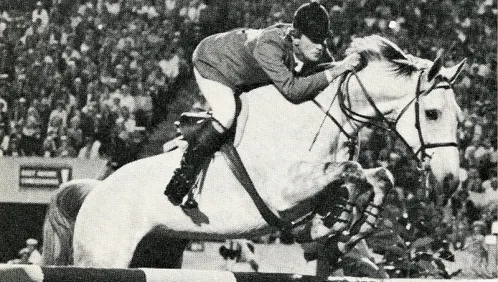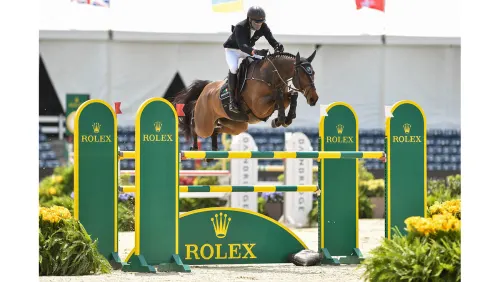Top horsemen throughout the country, from show jumping and dressage to combined driving and the racetrack, call Jane Forbes Clark a true friend and supporter of horse sports.
And she’s developed this reputation through dipping her pen into almost every aspect of U.S. horse sports—she’s a former president of the American Horse Shows Association (now U.S. Equestrian Federation) and president and CEO of the U.S. Equestrian Team Foundation.
Tracing back the origins of her early horse fetish, Clark promptly pinpointed her fourth Christmas. “I went down the stairs that morning to find a pony next to the tree with a bow around his neck,” she recalled. “He had a little bit of a bad side, but that could always be straightened out.”
Unlike most young girls who have to beg their parents for a pony, Clark’s entire family was engaged in some aspect of horse sports—her great uncle had a team of driving horses and polo ponies, and her mother and father rode foxhunters at the family’s Iroquois Farm in Cooperstown, N.Y. So, a pony under the Christmas tree was not unusual by Clark family standards.
“Over the years, horses and the industry have given a tremendous amount to me, and by supporting American horse sports and giving back I feel like I can make a difference,” said Clark, who currently owns numerous international-level driving horses, two Grand Prix-level dressage horses (as well as three up-and-coming Grand Prix prospects), six grand prix show jumpers and many others.
Clark’s early passion in life was for race horses—a passion that she shared with her parents who helped find her steeplechasing prospects. While many of the Thoroughbreds ran successfully, her highlight was on Aug. 11, 1974, when Jane was only 21 years old. Tommy Skiffington skillfully jockeyed her 9-year-old gelding, Augustus Bay, to victory in the $50,000 Colonial Cup (S.C.).
While winning the Colonial Cup is near the top of Clark’s list of memorable experiences, her early love for the track was slowly overshadowed as she acquainted herself more with show hunters in the late 1970s.
“As I became more interested in show horses and hunters and jumpers, it became a matter of having enough time to devote to having the horses. I found I was spending entire weekends at shows and had little time left to spend on the steeplechase circuit,” said Clark.
Ahead Of The Ball
“She’s obviously a huge supporter of the sport and a huge part of getting American equestrian teams to the levels we have in driving, dressage and show jumping,” said Molly Ashe, who rode Clark’s grand prix show jumper, Neuville, to victory in the 2006 Dublin Grand Prix (Ireland). “I’m forever grateful for the opportunities she’s given me and the support she’s contributed over the years.”
And if giving riders like Ashe the chance to compete successfully at an international level isn’t enough, Clark also donates another precious commodity to the horse industry—time.
“I’ve never worked with anyone who’s given as much as she has in both time, financial support and effort. She’s just amazing,” said four-in-hand driving champion Jimmy Fairclough. “I just can’t say enough—over the years she’s been a dynamic woman in the horse industry.”
Despite busy schedules and grinding horse show days, Ashe and Clark still manage to find time to devote toward developing their friendship. And for the young grand prix star, having Clark as a friend is as rewarding as showing Neuville.
“I feel like I can always go to her and talk about things going on in my life. She always offers sound advice and good points of view—which usually include telling me to calm down,” said Ashe with a laugh.
Whether it’s telling someone to relax and take a deep breath, or watching her horses school for the grand prix, Clark is always quick to jump in and lend a helping hand—even if it means rolling up her sleeves and getting a little dirty.
“We were at a horse show in Connecticut and after Jane finished showing, there was not a whole lot to do so we decided to help out one of the junior grooms. Jane and I grabbed a bucket of poultice, went into the stalls and started poulticing the horses. By the time we were done we had more of it on ourselves and the stall than we did on the horses,” recollected Ashe.
Perhaps one of the most intriguing and unusual aspects of Clark’s devotion to horse sports is that she hardly ever sells a horse. Instead, she prefers to give her horses the retirement they deserve when that time comes around.
“If Jane buys a horse, it has a home for life,” said Ashe. “She provides everything her horses could ever need or want. You don’t see older show jumpers being retired very often—they’re usually sold as someone’s junior or children’s jumper and they deserve better than that.”
Even when she’s bouncing back and forth between her homes in New York and Florida, juggling her responsibilities at her various jobs, and finding time to spend with friends, Clark always sets aside time for the horses.
“I try to ride around five horses a day several times a week,” said Clark, who no longer rides competitively. “I know what it takes to be on top of your game, and the hours required of me, and I just don’t have that kind of time. Right now I’m just having a wonderful time learning and don’t need the pressure of competition.”
In addition to spending time in the saddle, Clark also wears two other hats—one as a devoted president and trustee of the USET Foundation and the other as Chairman of the Board of Directors for the National Baseball Hall of Fame (N.Y.).
“I never wanted to be solely focused on one aspect of my life,” explained Clark, admitting that some days the workload can be daunting. “Thankfully, I have a great staff, and while some days it falls apart a little, most days it all works.”
ADVERTISEMENT
Clark’s grandfather, Stephen Carlton Clark, founded the National Baseball Hall of Fame in 1936. In 2000, Jane stepped up to the plate and took over as chairman.
“I tell people that I grew up on the steps of the Hall of Fame,” said Clark with a smile.
Part of her responsibilities as chairman include making sure the museum is operating properly, that the members are happy and that the museum does an accurate job telling the story of baseball and preserving its history. And since she “grew up on the steps of fame,” her dedication in running it comes naturally.
“We call ourselves ‘the guardians of the history of the game of baseball,’” said Clark, who refused to divulge her favorite team. “I think I would upset quite a few people if I said I had a favorite!”
Prior to taking the ball and running with it at NBHF, Clark served as president of the AHSA from 1991 until 1996. Other positions of leadership Clark’s held over the years include: senior vice president of the USET, director of the U.S. Olympic Committee and member of the Fédération Equestre Internationale executive board. In fact, Clark seems to live by the mantra that “too much is never enough.”
“Jane is one of the most dedicated and generous people serving our sport today. She’s given generously over the years as an owner of Team horses… and is now serving the sport as president of the Foundation. I’ve had the pleasure of working with her over the years and cannot think of anyone who is more suited to leading our efforts at the USET Foundation in support of our athletes and U.S. Equestrian Teams,” said Bonnie Jenkins, who worked with Clark at the AHSA and currently serves as vice president of the USET Foundation. “We’re truly fortunate to have someone of Jane’s experience and caliber taking the Foundation to the next step.”
From The Court To The Show Ring
Aside from her inherent enthusiasm for baseball and equestrian sports, Clark was an active teenager, playing softball, tennis, field hockey and basketball while attending high school at the Foxcroft School in Middleburg, Va.
Athletically inclined throughout high school, Clark’s life as a show ring competitor didn’t really blossom until she met Carol and Jim Phallon while attending classes at Bennett College (N.Y.). She purchased two horses from the Phallons, and she showed them in the amateur-owner division. But it was through Carol that Clark was introduced to the then up-and-coming show jumping rider, Leslie Howard.
“Carol asked Leslie if she would be interested in riding for me. I’d purchased Nashville Brass from Leslie, and Carol thought if she could introduce me to Frank Chapot that the three of us would make a great partnership. And she was right,” said Clark, who’s traveled all over Europe in search of hunter and jumper prospects with Chapot and Howard.
Over the course of their relationship, Clark had close to 30 horses in training with Howard, including the 1979 AHSA First Year Green Horse of the Year, Nashville Brass, and Extreme, Howard’s mount for the 1996 Atlanta Olympic Games. Other famous show hunters included Arrivaderci and Master Of The Game.
Through Howard, Clark met Ashe at the Fairfield Hunt Club (Conn.) in the early ’90s and started taking lessons from her.
“She’s not your typical amateur rider,” said Ashe of her initial impression of Clark’s abilities in the tack. “There’s no telling Jane, ‘You don’t know, you’re just an amateur.’ She has so much feel and knows her horses really well—almost too well sometimes. She can sense when they are going to spook, and she does what we call ‘the Jane Clark flying dismount,’ but is just as calm as could be when she jumps off.
“Jane and I laugh and say that any horse she rides is not allowed to do anything that begins with the letter ‘S’—like spin, spook, stare, stutter—but the horse does have to have scope, range and a sense of humor,” said Ashe.
Robert Dover, who has ridden three of Clark’s horses to Olympic team bronze medals in dressage, had to muffle a laugh as he said, “Jane’s a very sensitive rider with a real sense of feel, and funny too—she has a whole list of evasions that start with ‘S’ that she won’t allow her horses to do.”
Following Dover’s bronze-medal performance aboard Rainier at the 2000 Sydney Olympics, Clark decided that she wanted a better understanding of what it was like to ride a top-level dressage horse, so she entrusted Dover with the responsibility of finding one for her to practice on.
“When Robert would come out of the ring and say something had gone wrong or right, I wanted to know how those things felt rather than imagining,” said Clark.
Catching word that Richard Davison was thinking about retiring his mount of the 2000 Olympics, Hiscox Askari, Dover was soon on a plane to England to have a look.
“I rode the horse for a full 10 minutes, and from the minute I got on I knew that he was the right horse for her,” recalled Dover.
And he was right. From day No. 1, Clark and Askari clicked. “He’s a wonderful horse to start on because he’s so powerful. If I ask for something and ask correctly he does it beautifully. He’s taught me a lot over the years,” said Clark.
A Line Drive
In 1994, Clark caught wind that Fairclough’s driving team was for sale, in part because he didn’t have the sponsorship to compete abroad. After 14 years of competing on an international level, Fairclough was ready to hang up the tack for good. A full 12 years after contemplating retirement, he’s now looking forward to the next World Championships.
“She jumped on the carriage and asked me if there was an opening,” recollected Fairclough, thinking back to that day in 1994. “I didn’t know what she was talking about and she said, ‘to sponsor!’ ”
ADVERTISEMENT
Shocked at how eager Clark was to help, Fairclough accepted her offer, took his team off the market and resumed training at Top Brass Farm (N.J.), which he owns with his wife, Robin.
“I love the way the horses work together as a team as well as the format of the competition,” said Clark about her fixation with combined driving and her desire to sponsor Fairclough’s team.
During a competition in Ocala, Fla., in 1996, Clark had the privilege of riding in the back of the carriage as a navigator for Fairclough. She was in charge of making sure the driver went through the hazards in the correct order as well as stabilizing the carriage around fast and tight turns.
“It was a tremendous amount of fun but very hard. I woke up the next morning and every muscle in my body hurt,” said Clark with a groan. “Those carriages are padded, but that doesn’t help if you hit a tree!”
Fairclough also laughed as he recalled the incident. “I came around a turn too fast—she never said to slow down until I put the two leaders up a bank and the wheelers half way up—and she made some comment like, ‘Jimmy, this wasn’t in the plan.’ Just like that, as cool and calm as could be. Most people doing it for the first time aren’t like that.”
Like many owners, Clark always considers the animal’s well being rather than her personal investment, and her calm and focused personality attributes provide her with the ability to do just that.
Unable to fund a trip to Aachen, Germany, one year, Fairclough was resigned to not competing, but Clark wouldn’t allow it to happen and paid the expenses for the team to go because she believed the horses needed the experience.
“We were coming up to the last hazard, and I went around the turn too fast,” said Fairclough. “The horses got banged up pretty good. I still wanted to try and compete the next day, but Jane said, ‘No, Jimmy let’s go get a beer.’ Not many individuals would say that it’s just not meant to be.”
Despite her laid-back attitude, Clark remains unable to control her nerves when watching her horses compete. “Sometimes I think it would be better if I were riding them myself,” she said.
And, unfortunately for him, Dover has been on the receiving end of those nerves. “Some of my finest memories with Jane involve us standing up at the ring watching her jumpers go in the grand prix classes. I think I still have little scars all over my arms from where she indelibly imbedded her nails into me,” said Dover, rubbing his arm.
Medal Contention
“Owning an Olympic horse is owning an athlete at the top of his game,” said Jane Forbes Clark, who’s owned four Olympic medal contending horses. “Like any sport in the major leagues, the athlete needs a very good support team—in this case grooms, vets, farriers and riders who are always on top of the condition of the horse and how it’s cared for.”
Clark found just that team to take two of her horses to the 1996 Atlanta Olympics, a competition that remains one of her favorite memories. Extreme, with rider Leslie Howard, was on the show jumping team, and Metallic, with Robert Dover, competed in dressage.
“We had a great team that year [Michael Matz on Rhum IV, Peter Leone on Legato and Anne Kursinski on Eros],” said Howard about her fellow team members. “We won the team silver medal and with the exception of winning the gold, it couldn’t have been any better!”
Despite hundreds of grand prix rounds under her belt, Howard admitted that at a competition like the Olympics there’s always a lot of tension and stress. “But what’s so wonderful about Jane is that she’s always very patient, upbeat and understanding,” said Clark.
In a close finish behind the German team, Howard rode the 9-year-old mare to a clean second round, helping the U.S. team beat Brazil for the silver medal in show jumping.
“It’s amazing to go to the Games and come home with medals, but on a larger level seeing the U.S. team standing on the podium during a medal ceremony and knowing what you’ve done to help get them there is very rewarding,” said Clark.
Dover, who didn’t have a horse to compete in the 1996 Olympic Games until Clark leased him Anne Gribbons’ Metallic, said Clark’s completely dedicated to helping U.S. riders advance at the international level.
“She’s a great horse owner—a dream owner, in fact, because she’s very knowledgeable and respectful. When I say that a particular horse is the one I want to train, she says, ‘Do it.’ And she goes the whole nine yards,” he said.
In Atlanta, Dover’s third Olympic Games appearance, he earned the team bronze medal. And at the 2000 Sydney Olympics Dover rode Clark’s Rainier to team bronze once again. In keeping with tradition, he took home the team bronze for a third and final time at the 2004 Athens Olympics aboard FBW Kennedy, also owned by Clark, before retiring from competition.
“I’ve been privileged to be involved with top horsemen—it makes owning a top-caliber horse a lot easier to do when you know that everyone is paying close attention,” said Clark















